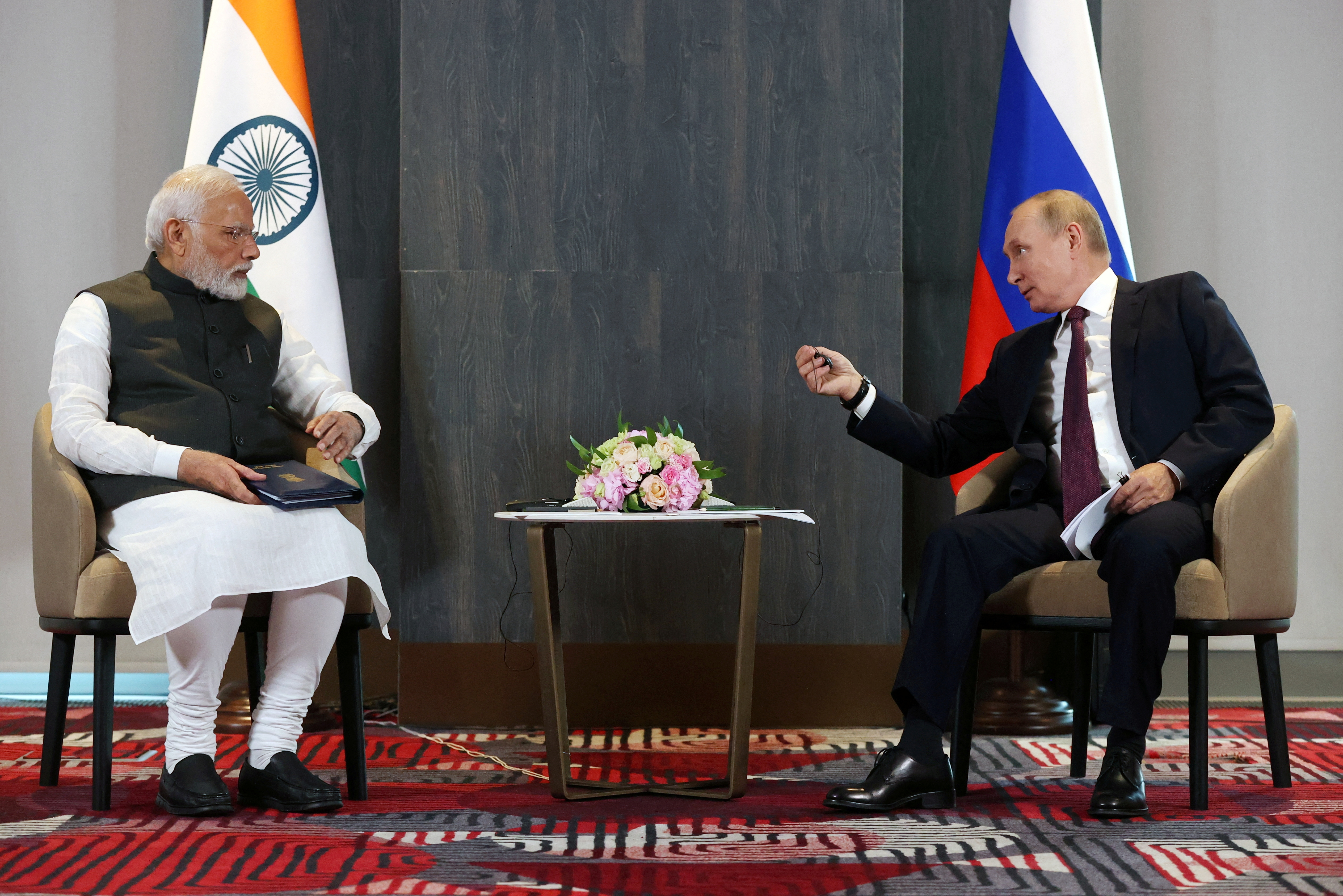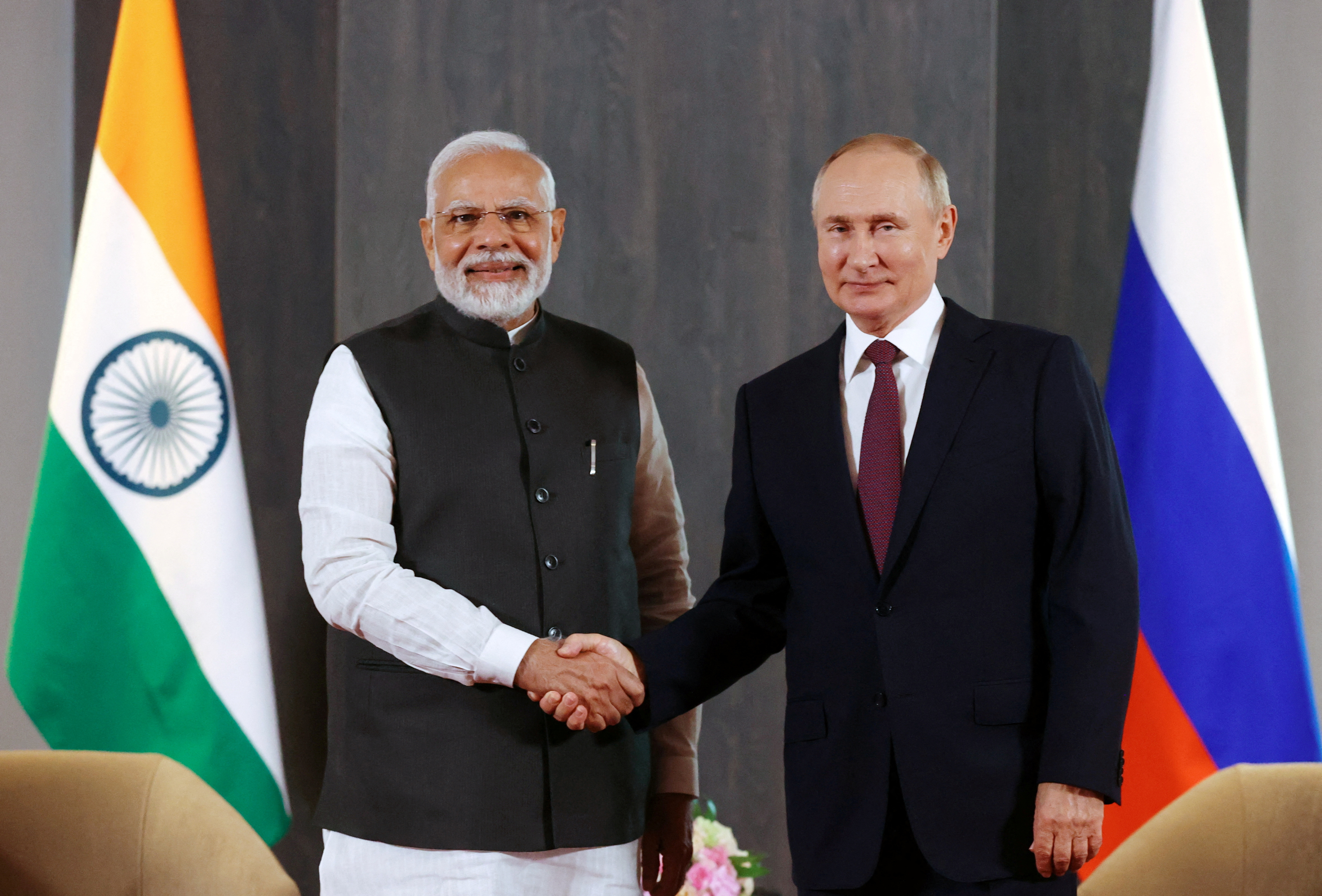Putin vows: “liberation” of Ukraine’s Entire East
Newslooks- SAMARKAND, Uzbekistan (AP)
Russian President Vladimir Putin vowed Friday to press his attack on Ukraine despite its latest counteroffensive and warned that Moscow could ramp up its strikes if Ukrainian forces target power plants and other infrastructure in Russia.
Speaking to reporters Friday after attending a summit of the Shanghai Cooperation Organization in Uzbekistan, Putin said the “liberation” of Ukraine’s entire eastern Donbas region remained Russia’s main military goal and that he sees no need to revise it.

“We aren’t in a rush,” the Russian leader said, adding that Russia has only deployed volunteer soldiers to fight in Ukraine.
Russia was forced to pull back its forces from large swaths of northeastern Ukraine last week after a swift Ukrainian counteroffensive. Ukraine’s move to reclaim control of several Russian-occupied cities and villages marked the largest military setback for Moscow since its forces had to retreat from areas near the capital early in the war.
Asked about the Ukrainian counteroffensive, Putin replied: “Let’s how it develops and how it ends.”

He alleged that Ukraine has attempted to launch attacks “near our nuclear facilities, nuclear power plants” in Russia and vowed to do “everything to prevent any negative turn of events.”
“We will retaliate if they fail to understand that such methods are unacceptable, they don’t differ from terrorism,” Putin said.
Putin also sought Friday to assuage India’s concern about the conflict in Ukraine, telling Indian Prime Minister Narendra Modi that Moscow wants to see a quick end to the fighting and alleging Ukrainian officials won’t negotiate.



“I know your stand on the conflict in Ukraine and the concerns that you have repeatedly voiced,” the Russian leader told Modi. “We will do all we can to end that as quickly as possible. Regrettably, the other side, the leadership of Ukraine, has rejected the negotiations process and stated that it wants to achieve its goals by military means, on the battlefield.”

Ukrainian President Volodymyr Zelenskyy has said it is Russia that allegedly doesn’t want to negotiate in earnest. He also has insisted on the withdrawal of Russian troops from occupied areas of Ukraine as a precondition for talks.
Putin’s remarks during the talks with Modi echoed similar comments he made during a meeting with Chinese President Xi Jinping the previous day.

China and India have refused to join Western sanctions against Russia over its war in Ukraine while increasing their purchases of Russian oil and gas, helping Moscow offset the financial restrictions imposed by the U.S. and its allies.
Putin also met Friday with Turkish President Recep Tayyip Erdogan to discuss bolstering economic cooperation and regional issues, including a July deal brokered by Turkey and the U.N. that allowed Ukrainian grain exports to resume from the country’s Black Sea ports.

Speaking at the Uzbekistan summit on Friday, Xi warned his Central Asian neighbors not to allow outsiders to destabilize them. The warning reflects Beijing’s anxiety that Western support for pro-democracy and human rights activists is a plot to undermine Xi’s ruling Communist Party and other authoritarian governments.

“We should prevent external forces from instigating a color revolution,” Xi said in a speech to leaders of Shanghai Cooperation Organization member nations, referring to protests that toppled unpopular regimes in the former Soviet Union and the Middle East.
Xi offered to train 2,000 police officers, to set up a regional counterterrorism training center and to “strengthen law enforcement capacity building.” He gave no details.

His comments echoed longtime Russian grievances about the color-coded uprisings in several ex-Soviet nations that the Kremlin viewed as instigated by the U.S. and its allies.
Xi is promoting a “Global Security Initiative” announced in April following the formation of the Quad by the U.S., Japan, Australia and India in response to Beijing’s more assertive foreign policy. Xi has given few details, but U.S. officials complain it echoes Russian arguments in support of Moscow’s actions in Ukraine.

China’s relations with Washington, Europe, Japan and India have been strained by disputes about technology, security, human rights and territory.
Central Asia is part of China’s multibillion-dollar Belt and Road Initiative to expand trade by building ports, railways and other infrastructure across an arc of dozens of countries from the South Pacific through Asia to the Middle East, Europe and Africa.

The Shanghai Cooperation Organization was formed by Russia and China as a counterweight to U.S. influence. The group also includes India, Pakistan and four ex-Soviet Central Asian nations of Kazakhstan, Kyrgyzstan, Tajikistan and Uzbekistan. Iran is on track to receive full membership.
On Thursday, Putin held a one-on-one meeting with Xi and thanked the Chinese leader for his government’s “balanced position” on the Ukraine war, while adding that he was ready to discuss unspecified China’s “concerns” about Ukraine.

Xi, in a statement released by his government, expressed support for Russia’s “core interests” but also interest in working together to “inject stability” into world affairs.
Li Xin, director of the Institute of European and Asian Studies of Shanghai University of Political Science and Law, noted that Beijing wants a negotiated end to the Ukraine war, adding that “China will not judge whether the special military operation of Russia is just or not.”







